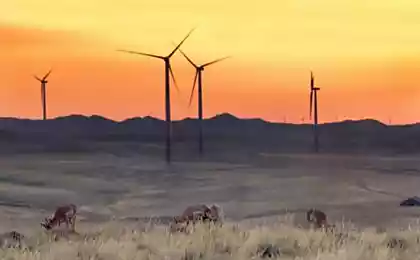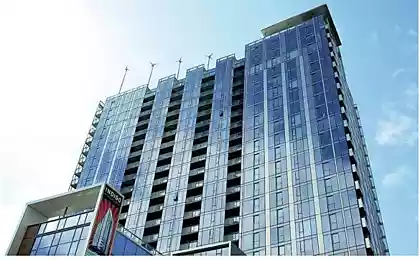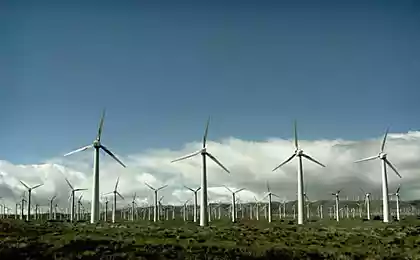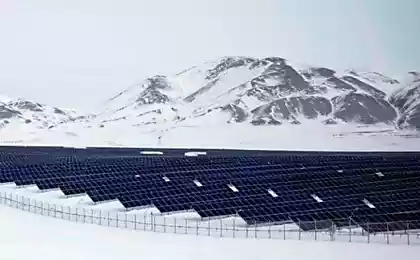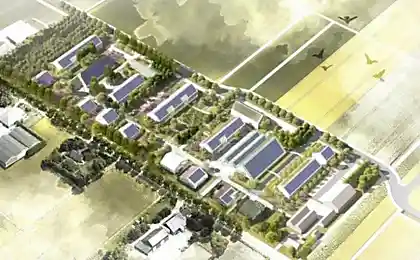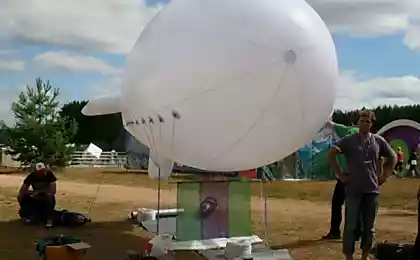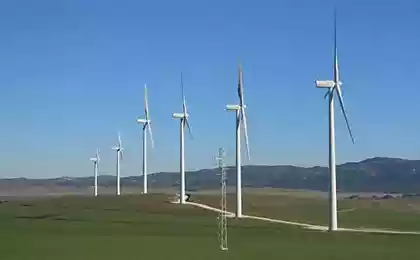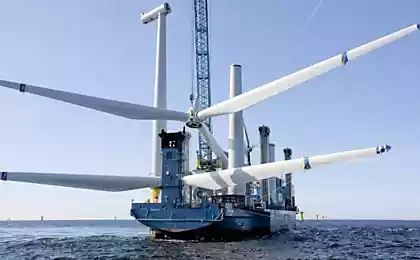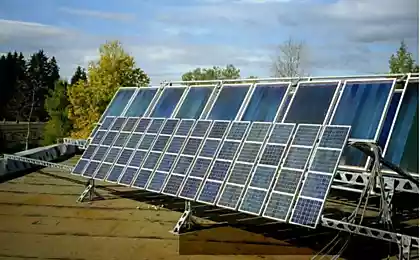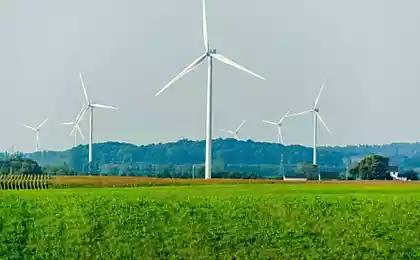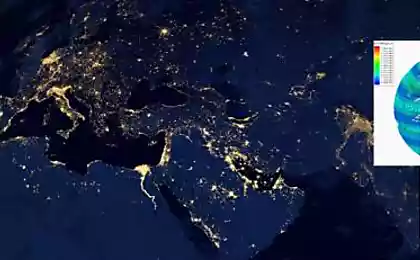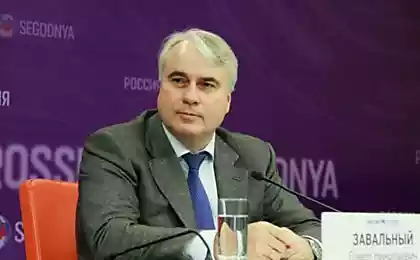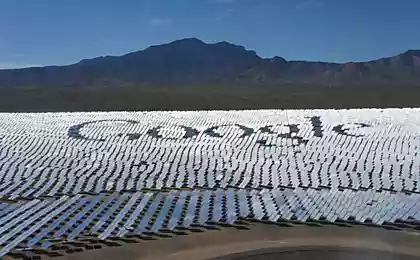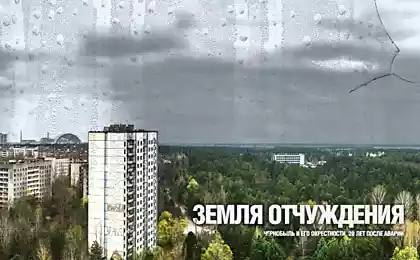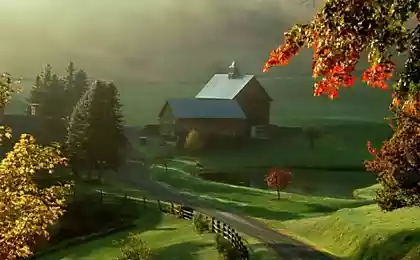509
City zero. Zero discharge or "zero exhaust"?
Abu Dhabi- the largest of the United Arab Emirates — in recent years taking bold steps towards environmentally safe future. Probably most clearly this trend illustrates the Masdar city, whose construction began in the Arabian Peninsula in 2006. The city conceived the ultra-modern, environmentally friendly and "zero-emission" of carbon. The ambitious project aims to make a breakthrough in the architecture and energy to create a special University environment designed to solve the problems of renewable energy, and set the new urban vector on a global scale.
Masdar is located in the suburbs of the capital of UAE, Abu Dhabi, in the North-Eastern part of the Gulf. The climate is hot and dry, often there are sandstorms. The temperature during summer months fluctuates in the range of 40-45 °C, but sometimes reaches 50 °C. These weather conditions are especially conducive to the development of photovoltaic technologies. Indeed, the city of the future today 100% supplied with electricity from a photovoltaic plant deployed in the neighborhood.
However, the scorching sun is not only a source of renewable energy, but also a problem for residents. And this problem was architectural decision: the streets of Masdar is quite narrow, not more than 3 m wide, almost completely hidden in the saving shade of the buildings. The city's architecture is worthy of a separate article. Traditional Arabic motifs are gracefully inscribed in postconstructivist model development. The slots on the facades are formed in a variety of delicate drawings, fulfilling not only aesthetic but technical problem — namely, providing natural ventilation of buildings. Stepped eaves on the undulating terracotta facades give the streets a similarity with clay canyons. Green spaces on roofs reinforce the illusion of a natural origin of the urban environment.
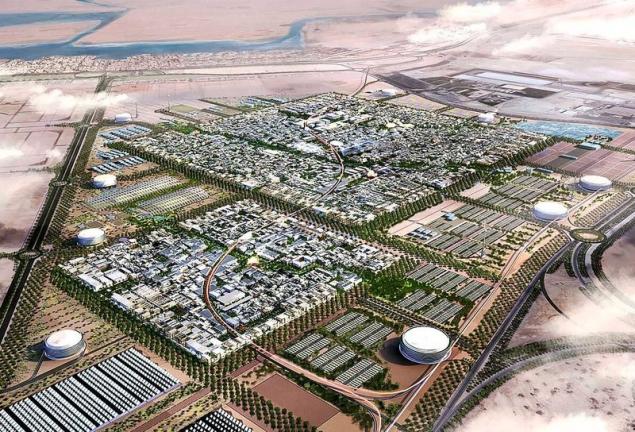
Any major project will inevitably meets with criticism. And Masdar is also not escaped this fate. The idea of the city with zero emissions of openly laughed. And ridicule those not groundless, because next to the city built Ferrari race track and Word track for the cars of Formulal — Yas F1 race.
In the construction of any city, even using the most "green" materials, it is impossible to do without harmful emissions. At least the tools and supplies require the production, in which carbon, and the work of construction machinery does not contribute to improve the environmental situation.
Transport is another proclaimed environmental benefit of the city, which has become a problem. The fact that on the territory of Masdar completely prohibited the movement of cars with internal combustion engines. In the city you can take a taxi (electric car), but what to do with the car in which you arrived? The construction branch the "light" metro, which will connect Masdar with Abu Dhabi plan to be completed only by 2030. The only argument in favor of urban planners is the fact that near the city is the international airport of Abu Dhabi.
The city of the future is surrounded with a wall, which became another reason for the attacks of the skeptics. Masdar liked the "restricted" city, a toy for the elite, closed to ordinary citizens. Wall, however, performs a completely different function. It protects the city from storms, and to get to the Masdar can be anyone around the clock.
However, the topic class orientation of Masdar is far from unambiguous. For the working class city of the future today is really unattractive. The city still has not created enough jobs, and live there, working in the capital, is inconvenient because of the traffic situation in the city.
Companies working in the field of renewable energy, has shown great interest in the project. About three hundred firms, including GE Ecomagination Corporation, Lockhead Martin and other industrial heavyweights opened their offices in Masdar. However, most of these offices do not serve a permanent working place for employees. International renewable energy Agency (IRENA) decided to settle down in Abu Dhabi after he was offered space in a building equipped with the latest technology. Thanks to the airtight insulation and high-tech elevators is a six-story building consumes three times less energy than similar office centre operating in Abu Dhabi. Moreover, in the building there is practically no overhead lighting; there's natural lighting, provided with translucent facade designs of large area. Also on the roof of the headquarters of IRENA is also installed solar water heaters.
The idea of the future city implements the architectural firm Foster & Partners. In the development of the project was attended by Norman foster, a famous British architect, winner of the Imperial prize. It was planned that in Masdar settle 50 thousand and 40 thousand will visit the city daily. Space in the city is organized in such a way that all objects located within walking distance.
You can take a taxi. It is a small unmanned electric vehicles, equipped with a touchscreen, which in a few taps you can determine the destination. The Central core of the city is located on the podium (in the language of architects stylobate), which should accommodate all city services. There is amazing for its plasticity ladder, perhaps the only one in town with a huge number of escalators and travelators. In the city centre is the head office of Siemens in the middle East. It is a rectangular futuristic building combines a bold visual statement with high technological equipment. The absolute dominant of the city center, where high-rise building does not exceed six floors, is the cooling tower. This 65-foot structure with a frame made of light alloy, is designed to direct air flow to the area, removing excess heat through built-in irrigation chamber of cylindrical shape.
The main distinguishing element acts Masdar Institute (Masdar Institute of Science and Technology), founded jointly with the American University US. In this school particular emphasis is placed on ecology and renewable energy sources. According to the organizers, Masdar Institute should become a world center for renewable energy development. Today, in the shade of the many cafes you can see students from different countries resting in between sessions. Perhaps these young people will become adepts of the new, postprandialno the world, which have long been the dream of our ecologists, and all who are not indifferent to the fate of the planet people.
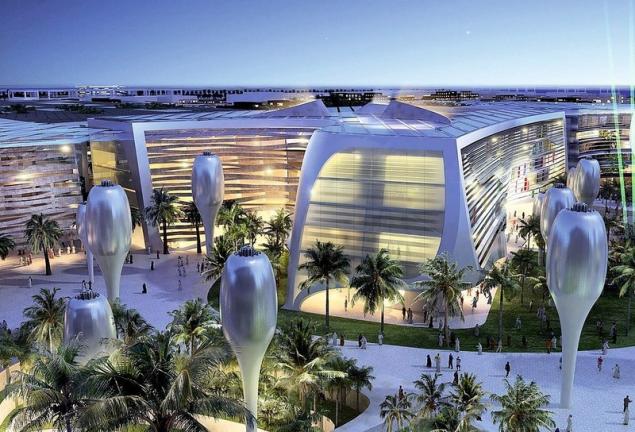
When the financial crisis hit, the construction had to be frozen. In the ten years that have passed since 2006, was commissioned only 5% of buildings that had been planned on the territory of 6 km2, designated for construction. The Western press dubbed Masdar a Ghost town, posting pictures of empty streets and uninhabited buildings.
Even the managers responsible for the construction, in the end, were forced to recognize that to build a city with zero carbon emissions failed. However, the city, which itself recycles waste, completely independent from centralized energy and collects rainwater, of course, is an advanced project that has no analogues in the world. By the way, the water in this part of the Arabian Peninsula in a big deficit, and even 100 mm of annual rainfall (in Moscow only in August this year has received more than 170 mm) are of value.
The construction of the city of the future is a Grand experiment, the implementation of which the Corporation Mubadala plans to spend $ 22 billion Original construction schedule ended in 2016, but the deadline is postponed to 2030. Will the Masdar city of the future, where clean streets silently scurry about electric cars, where the air is crisp, the sky dissected by a web of cables, and facades buzz conditioners, or will become the first green a Ghost town? Only time will tell. After a lull caused by the credit crisis, construction was resumed. Chief design Manager of Masdar Chris van denies the failure of his brainchild. He calls the project part of the evolutionary process.
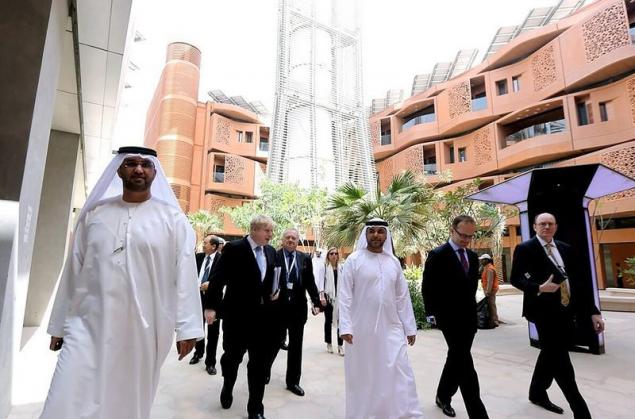
The city of the future is one of the most high-profile projects, which symbolizes the political path marked out for the leadership of the UAE. In January of this year, an absolute monarch, the Emir of Abu Dhabi, Sheik Mohammed Bin Rashid wrote on his Twitter account: "Paying tribute to the last barrel of oil, as my brother Mohammed Bin Zayed, we will create a sustainable economy that will guarantee stability for future generations". published
Source: www.c-o-k.ru/articles/gorod-zero-nulevoy-vybros-ili-nulevoy-vyhlop
Masdar is located in the suburbs of the capital of UAE, Abu Dhabi, in the North-Eastern part of the Gulf. The climate is hot and dry, often there are sandstorms. The temperature during summer months fluctuates in the range of 40-45 °C, but sometimes reaches 50 °C. These weather conditions are especially conducive to the development of photovoltaic technologies. Indeed, the city of the future today 100% supplied with electricity from a photovoltaic plant deployed in the neighborhood.
However, the scorching sun is not only a source of renewable energy, but also a problem for residents. And this problem was architectural decision: the streets of Masdar is quite narrow, not more than 3 m wide, almost completely hidden in the saving shade of the buildings. The city's architecture is worthy of a separate article. Traditional Arabic motifs are gracefully inscribed in postconstructivist model development. The slots on the facades are formed in a variety of delicate drawings, fulfilling not only aesthetic but technical problem — namely, providing natural ventilation of buildings. Stepped eaves on the undulating terracotta facades give the streets a similarity with clay canyons. Green spaces on roofs reinforce the illusion of a natural origin of the urban environment.

Any major project will inevitably meets with criticism. And Masdar is also not escaped this fate. The idea of the city with zero emissions of openly laughed. And ridicule those not groundless, because next to the city built Ferrari race track and Word track for the cars of Formulal — Yas F1 race.
In the construction of any city, even using the most "green" materials, it is impossible to do without harmful emissions. At least the tools and supplies require the production, in which carbon, and the work of construction machinery does not contribute to improve the environmental situation.
Transport is another proclaimed environmental benefit of the city, which has become a problem. The fact that on the territory of Masdar completely prohibited the movement of cars with internal combustion engines. In the city you can take a taxi (electric car), but what to do with the car in which you arrived? The construction branch the "light" metro, which will connect Masdar with Abu Dhabi plan to be completed only by 2030. The only argument in favor of urban planners is the fact that near the city is the international airport of Abu Dhabi.
The city of the future is surrounded with a wall, which became another reason for the attacks of the skeptics. Masdar liked the "restricted" city, a toy for the elite, closed to ordinary citizens. Wall, however, performs a completely different function. It protects the city from storms, and to get to the Masdar can be anyone around the clock.
However, the topic class orientation of Masdar is far from unambiguous. For the working class city of the future today is really unattractive. The city still has not created enough jobs, and live there, working in the capital, is inconvenient because of the traffic situation in the city.
Companies working in the field of renewable energy, has shown great interest in the project. About three hundred firms, including GE Ecomagination Corporation, Lockhead Martin and other industrial heavyweights opened their offices in Masdar. However, most of these offices do not serve a permanent working place for employees. International renewable energy Agency (IRENA) decided to settle down in Abu Dhabi after he was offered space in a building equipped with the latest technology. Thanks to the airtight insulation and high-tech elevators is a six-story building consumes three times less energy than similar office centre operating in Abu Dhabi. Moreover, in the building there is practically no overhead lighting; there's natural lighting, provided with translucent facade designs of large area. Also on the roof of the headquarters of IRENA is also installed solar water heaters.
The idea of the future city implements the architectural firm Foster & Partners. In the development of the project was attended by Norman foster, a famous British architect, winner of the Imperial prize. It was planned that in Masdar settle 50 thousand and 40 thousand will visit the city daily. Space in the city is organized in such a way that all objects located within walking distance.
You can take a taxi. It is a small unmanned electric vehicles, equipped with a touchscreen, which in a few taps you can determine the destination. The Central core of the city is located on the podium (in the language of architects stylobate), which should accommodate all city services. There is amazing for its plasticity ladder, perhaps the only one in town with a huge number of escalators and travelators. In the city centre is the head office of Siemens in the middle East. It is a rectangular futuristic building combines a bold visual statement with high technological equipment. The absolute dominant of the city center, where high-rise building does not exceed six floors, is the cooling tower. This 65-foot structure with a frame made of light alloy, is designed to direct air flow to the area, removing excess heat through built-in irrigation chamber of cylindrical shape.
The main distinguishing element acts Masdar Institute (Masdar Institute of Science and Technology), founded jointly with the American University US. In this school particular emphasis is placed on ecology and renewable energy sources. According to the organizers, Masdar Institute should become a world center for renewable energy development. Today, in the shade of the many cafes you can see students from different countries resting in between sessions. Perhaps these young people will become adepts of the new, postprandialno the world, which have long been the dream of our ecologists, and all who are not indifferent to the fate of the planet people.

When the financial crisis hit, the construction had to be frozen. In the ten years that have passed since 2006, was commissioned only 5% of buildings that had been planned on the territory of 6 km2, designated for construction. The Western press dubbed Masdar a Ghost town, posting pictures of empty streets and uninhabited buildings.
Even the managers responsible for the construction, in the end, were forced to recognize that to build a city with zero carbon emissions failed. However, the city, which itself recycles waste, completely independent from centralized energy and collects rainwater, of course, is an advanced project that has no analogues in the world. By the way, the water in this part of the Arabian Peninsula in a big deficit, and even 100 mm of annual rainfall (in Moscow only in August this year has received more than 170 mm) are of value.
The construction of the city of the future is a Grand experiment, the implementation of which the Corporation Mubadala plans to spend $ 22 billion Original construction schedule ended in 2016, but the deadline is postponed to 2030. Will the Masdar city of the future, where clean streets silently scurry about electric cars, where the air is crisp, the sky dissected by a web of cables, and facades buzz conditioners, or will become the first green a Ghost town? Only time will tell. After a lull caused by the credit crisis, construction was resumed. Chief design Manager of Masdar Chris van denies the failure of his brainchild. He calls the project part of the evolutionary process.

The city of the future is one of the most high-profile projects, which symbolizes the political path marked out for the leadership of the UAE. In January of this year, an absolute monarch, the Emir of Abu Dhabi, Sheik Mohammed Bin Rashid wrote on his Twitter account: "Paying tribute to the last barrel of oil, as my brother Mohammed Bin Zayed, we will create a sustainable economy that will guarantee stability for future generations". published
Source: www.c-o-k.ru/articles/gorod-zero-nulevoy-vybros-ili-nulevoy-vyhlop
